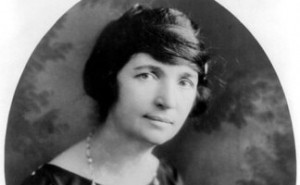 I know I said this column would explore what we can learn about leadership from the presidential candidates’ endless mud-wrestling on our television screens these days. That’s a fascinating analysis I’ll get to eventually—we’ll have plenty of time since the election is still fourteen months away!
I know I said this column would explore what we can learn about leadership from the presidential candidates’ endless mud-wrestling on our television screens these days. That’s a fascinating analysis I’ll get to eventually—we’ll have plenty of time since the election is still fourteen months away!
But when I realized I’d be writing this column on September 14, the birthday of a significant mentor in my life, I chose instead to focus on the most important leadership lesson I learned from her.
I never met this mentor. She died before I’d heard of her or had any idea that I would one day wear her mantle. Yet her influence on my life, and I’ll bet on yours, was profound.
She was the daughter of a pious Catholic mother and a Freethinker father, courageous and cranky, a youthful New York Socialist who died a Republican in Arizona, a mother, grandmother, sexual libertine, a woman of many contradictions—but then aren’t we all?
Margaret Higgins was born in Corning NY in 1879. Her mother, Anne Higgins, died worn out from too frequent pregnancies and births, at age 50. This undoubtedly formed Margaret’s sensibilities about the moral rightness of birth control, a term she didn’t invent but took up using until it became part of the cultural consciousness.
Have you figured out that I’m talking about Margaret Sanger, founder of the American Birth Control Movement?
Now, I was a small town Texas girl, whose journey began as a teen wife and mother of three with little sense of power or intention for my life. The birth control pill, just one result of Sanger’s indomitable work, saved my life. It allowed me to have a life. It let me be there fully for my children, yet at the same time, because I could plan my childbearing, I could also attend college and start a career.
Little did I know it would also propel my life’s passion-to make sure all women have equal rights and opportunities. No way could I have known I would one day follow Sanger as leader of the world’s largest reproductive health provider and advocacy organization, Planned Parenthood, and then carry my work for women forward today as an author, speaker, and commentator on women and leadership.
You might or might not agree with everything about Sanger’s work, or mine. That’s perfectly fine, but not the point.
It’s relevant to note that traditionally, men with leadership proclivities have tended to start businesses and create wealth or/and go into politics. Women leaders, on the other hand, tended to start social movements and nonprofits: Susan B. Anthony and women’s rights, Jane Addams and the Settlement House, Candy Lightner and Mothers Against Drunk Driving, Nancy Brinker and Susan G. Komen for the Cure to fight breast cancer, Emily May and Hollaback! just to name a few besides Sanger.
Personally, I’d like to see more women thinking as big as, say, Bill Gates or Mark Zuckerberg, and create world-changing business ventures.
But whatever the pursuit, whether in business, politics, or the nonprofit sector, the most successful leaders have one attribute in common.
The #1 leadership lesson I learned from Margaret Sanger is this:
Start with a vision. Not a small, incremental vision, but a bold, audacious, flaming red, bigger-than-yourself vision.
She created a world-changing movement by having a big, clear, compelling vision on which she remained laser focused.
“No woman, “ she said, “can call herself free until she can own and control her own body. No woman can call herself free unless she can decide for herself whether and when to become a mother.”
That was her core conviction, but no one knew better than she that convictions alone weren’t enough. “We must put our convictions into action,” she was fond of saying.
A bold vision creates meaning, not just for the visionary, but also for the rest of us who are then able to see ourselves in it, and the actions begin to manifest themselves. As Professor of Business Administration and leadership studies pioneer, Warren Bennis puts it, “The leader’s goal is not mere explanation or clarification but the creation of meaning.”
For example, while Nick Kristof and Sheryl WuDunn, husband and wife journalists who wrote the 2009 blockbuster Half the Sky are lauded for saying women’s rights are the great moral imperative of the 21st century, and I’m glad they are, the fact is Margaret Sanger said the essentially same thing 100 years ago. That kind of endurance is characteristic of a bold vision. It continues to compel action even after the originator has gone.
What is your bold vision for yourself and your career?
How have you observed yourself or others using the power of a vision to lead effectively?
This column was originally posted here on BlogHer Career, where you can find lots of lively discussion going on. Please check it out – would love to hear your thoughts!
Also, you can read the speech I gave at the Brooklyn Museum if you’d like to know more about Margaret Sanger’s life and the other leadership lessons I learned from her.
Gloria Feldt
Latest posts by Gloria Feldt (Posts)
- This Blog is No Longer Active… - March 17, 2014
- Women’s Equality Day and the Civil Rights March - August 26, 2013
- Stuck? Change Your Relationship With Power - July 21, 2013






 "Female Writers Kicking Up Literary Dust"
"Female Writers Kicking Up Literary Dust"